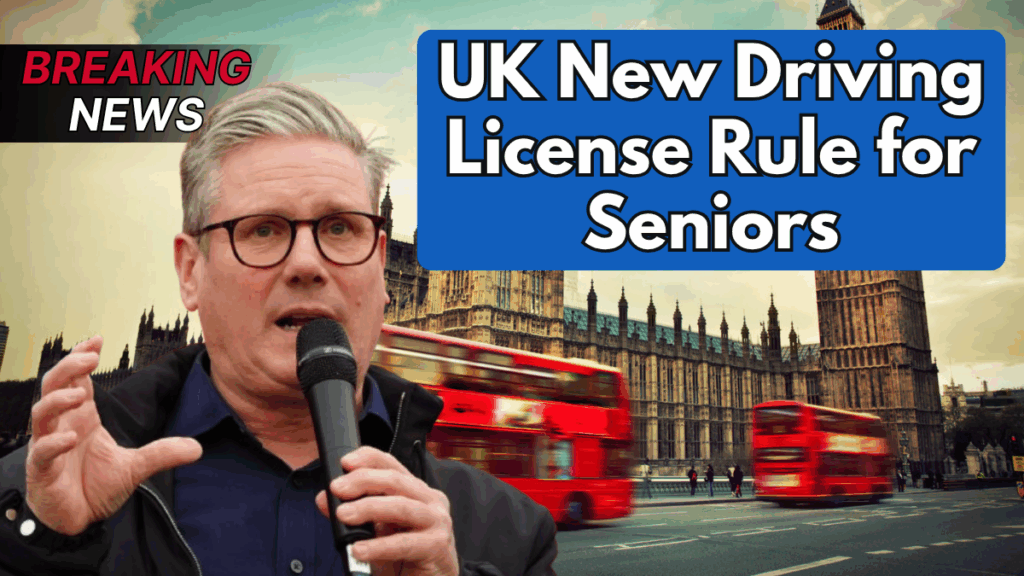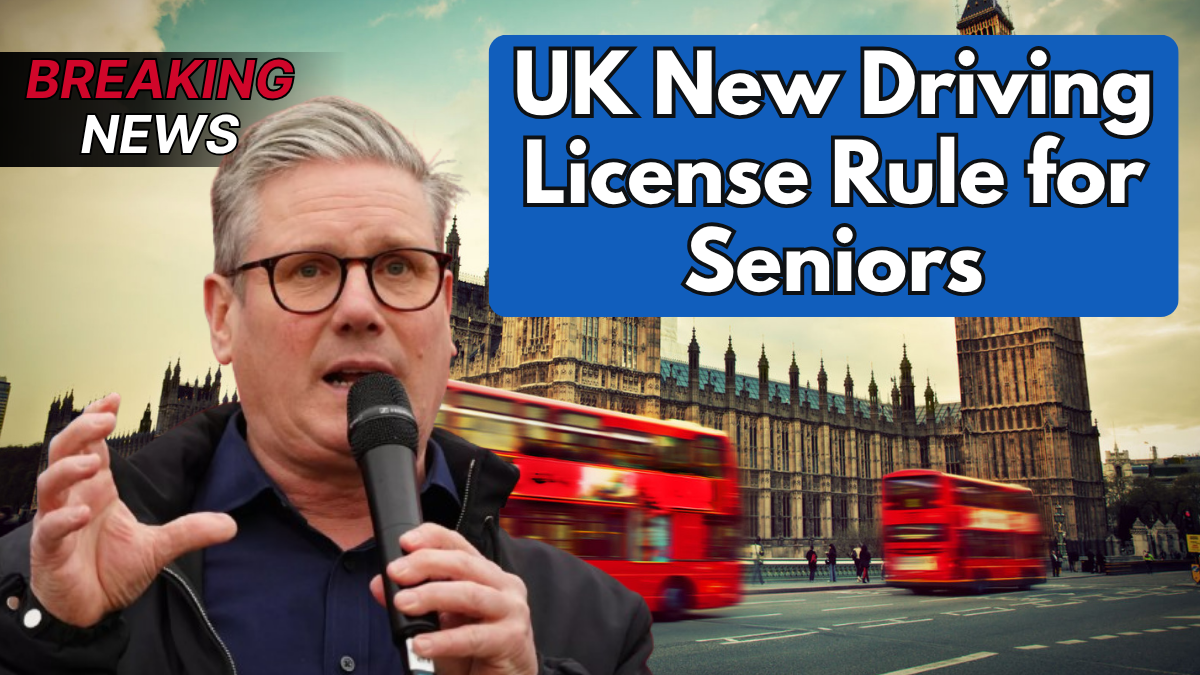The UK is updating how senior motorists keep licences valid and safe. From 8 November 2025, the Driver and Vehicle Licensing Agency will introduce a shorter renewal cycle for older drivers, integrate clearer medical fitness checks, and offer a more streamlined digital journey through GOV.UK. The goal is practical and balanced. Roads must remain safe as the number of older drivers grows, and seniors need renewal tools that are simple, predictable, and fair. If you are approaching age 60 or already over 70, understanding the new timelines, what information you must declare, and how to renew online will help you avoid gaps in entitlement and insurance complications.

What changes on 8 November 2025
The update focuses on renewal frequency, fitness to drive, and service options.
- Age based renewal cycle
- Age 60 to 69 renew every 3 years
- Age 70 and over renew every 2 years
Shorter cycles allow the DVLA to confirm eyesight and medical fitness more regularly while keeping the steps straightforward for motorists.
- Health and vision declarations
All senior renewals include a self declaration about conditions that can affect safe driving. In specific cases the DVLA can request GP or consultant evidence, an optician report, or an on road assessment. - Improved online renewal
The GOV.UK journey uses guided questions, digital identity options, secure payment where applicable, application tracking, and email or text reminders before the next renewal. - Optional digital driving licence
Seniors can choose a digital credential inside an official app that mirrors the photocard details. The plastic photocard remains valid and can be used on its own.
Short Summary
| Item | Details |
|---|---|
| Start date | 8 November 2025 |
| Who is affected | Drivers aged 60 and above in England, Scotland, Wales, Northern Ireland rules may vary, check local guidance |
| Renewal cycle | Age 60 to 69 renew every 3 years, age 70 and over renew every 2 years |
| Health and vision | Mandatory self declaration, GP or specialist reports where required, eyesight must meet legal standards |
| Digital licence | Optional smartphone based credential, physical photocard remains valid |
| How to renew | GOV.UK online service with digital ID, or paper and Post Office routes |
| Key risks | Non disclosure of medical conditions, expired licence use, incorrect bank or contact details delaying processing |
| Penalties | Fines up to £1,000, potential insurance issues, possible disqualification for serious breaches |
| Official site | https://www.gov.uk/renew-driving-licence |
Renewal frequency and who it applies to
- Drivers aged 60 to 69 renew every 36 months. This group often remains active in work or caring roles, so the process is designed to be fast, largely self service, and focused on eyesight standards plus declared conditions.
- Drivers aged 70 and over renew every 24 months. This keeps contact regular, ensures any new health information is captured, and gives drivers confidence that they remain legally fit to drive.
If you receive a licence with a shorter validity because of a disclosed condition, that specific period will be printed on your photocard and shown in your online account.
Health and fitness to drive
Safety sits at the centre of the new framework. You must declare any condition that can affect safe driving. Typical areas include vision disorders such as cataracts and glaucoma, neurological conditions such as epilepsy or dementia, cardiovascular disorders that can impair consciousness or cause sudden incapacity, and diabetes that requires insulin or has complications affecting awareness.
- Vision. You must meet legal eyesight standards including number plate recognition at the required distance and suitable visual fields. Glasses or contact lenses can be used if they bring you to the legal threshold.
- Medication. Some medicines can affect alertness. If your GP or specialist advises that a drug regimen impacts driving, you must follow their advice and declare where required.
- Temporary suspensions. If a specialist advises that you should stop driving for a period, the DVLA can hold the renewal until you meet standards again. Reinstatement proceeds once evidence confirms that it is safe.
Medical review pathway
A medical review is requested when declarations or healthcare information suggest that a closer check is needed.
- You complete a health disclosure during renewal
- The DVLA requests forms or a report from your GP or consultant
- Additional eyesight or on road assessments can be scheduled for specific conditions
- A decision is issued after review, with clear reasons if restrictions or shorter duration are applied
Keeping your GP details current and responding quickly to information requests keeps the review timeline short.
Digital services that simplify renewal
The updated GOV.UK flow focuses on clarity and speed.
- Digital identity using a valid passport or approved method
- Direct upload of medical evidence when requested
- Live application tracking and message history
- Email and text alerts for outstanding tasks and next renewal reminders
For motorists who prefer paper, a photocard renewal by post remains available. The Post Office can assist with identity photos and form submission.
Optional digital driving licence
From November 2025 a digital view of your licence can live on your smartphone. It shows your photo, licence number, expiry date, and a dynamic QR code that allows authorities to confirm validity. Updates refresh automatically after renewals or administrative changes. The photocard stays fully valid and many drivers will continue to carry it as the primary document.
Preparation checklist before the rule change
- Check your licence expiry date and diary the new cycle that applies to your age bracket
- Book an eye test with a registered optician and keep the receipt in case evidence is needed
- Review your medical history with your GP if you have conditions that might affect driving
- Create or update your GOV.UK and DVLA online accounts and opt in to reminders
- Confirm your email, mobile number, and postal address are correct
- Keep your passport details handy for digital verification
- If you prefer paper, collect the renewal form early and prepare a compliant passport style photo
Why the update matters and how it affects you
Shorter renewal cycles are not about removing older drivers from the road. The intent is to balance independence and safety. Many seniors maintain excellent driving standards, but regular eyesight and health reviews help everyone share the road with confidence. For the individual motorist, more frequent renewal means more predictable checks, better record accuracy, and fewer surprises with insurers or police stops. For families, it provides a structured way to talk about fitness to drive without stigma, guided by clear rules instead of guesswork.
Compliance, penalties, and insurance
You must not drive with an expired licence, and you must disclose relevant conditions that the law requires you to report. Failure to comply can lead to fines up to £1,000, potential prosecution for serious breaches, and insurance claims may be affected if you were not legally entitled to drive. Renew early, keep copies of submissions, and do not ignore DVLA requests for information.
Common mistakes to avoid
- Waiting until the expiry week to start renewal
- Failing to update contact details which causes missed letters or emails
- Declining to declare a condition that clearly affects safe driving
- Assuming glasses or lenses remove the need for an eyesight check without confirmation
- Uploading blurred photos or unreadable medical documents which triggers rework and delays
Official site
Use the official GOV.UK service to renew or to check the latest guidance
https://www.gov.uk/renew-driving-licence
Frequently Asked Questions
1) How often do I need to renew once I turn 60
From 8 November 2025 drivers aged 60 to 69 renew every 3 years. From age 70 you renew every 2 years. Your photocard and online account will show the exact expiry date.
2) Do I have to pass a driving test again under the new rules
No routine re test is required. However, if a medical condition or assessment indicates that an on road evaluation is appropriate, the DVLA can arrange one before issuing or renewing a licence.
3) What medical conditions must I declare
You must declare conditions that can affect safe driving. These include eyesight problems such as cataracts or glaucoma, neurological illnesses such as epilepsy or dementia, significant heart disorders, and diabetes with risks that affect awareness. When in doubt, seek advice from your GP and consult GOV.UK condition lists.
4) Is the digital driving licence compulsory
No. The digital version is optional. Your existing photocard remains valid. You may carry both if that is convenient.
5) What happens if I forget to renew or I drive after expiry
Driving without a valid licence can lead to fines up to £1,000, insurance complications, and potential disqualification in serious cases. Renew ahead of time, enable reminders in your DVLA online account, and keep your contact details up to date.
Conclusion
Senior drivers play a vital role in UK mobility and community life. The 8 November 2025 update aims to protect that independence while strengthening safety. Shorter renewal cycles, clearer health checks, and easier online tools remove guesswork and reduce paperwork. Prepare now by confirming your expiry date, arranging an eye test, checking your GOV.UK account, and gathering any medical evidence that may be needed. With a little planning the new system will help you keep driving confidently and legally for many years to come.
For More Information Click HERE
